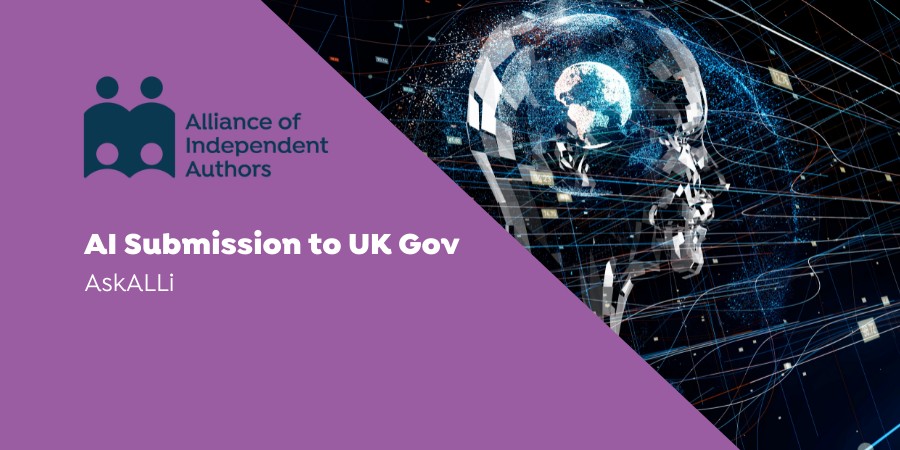
Orna Ross, Director of ALLi
The UK government is engaged in a consultation process around artificial and augmented intelligence (AI) and intellectual property (IP) that is pertinent to authors everywhere. Orna Ross reports on the Alliance of Independent Authors (ALLi)’s most recent response to the UK government, which considers the questions from the perspective of self-publishing authors. With thanks to Joanna Penn, ALLi's AI & Enterprise Advisor.
You can see the UK government's press statement about the consultation here and consultation information is here.
Authors, Artificial Intelligence and IP
Artificial intelligence (AI) is playing an increasing role in both technical innovation and artistic creativity in a range of ways. AI can be a tool for scientists, entrepreneurs, artists and writers, enabling and supporting new human inventions and creations.
Although AI doesn't have agency, it can invent and create works where it is difficult or impossible to identify the human intellectual input. This is already happening in the author space, with writers using AI tools to support their writing and marketing and other publishing activities.
The challenge for governments is to create copyright and IP systems that foster AI development and innovation and human creativity and innovation, so that AI-generated works secure benefits to society and to copyright holders.
The UK is aiming to be “a global superpower in AI” and sees itself as “well placed to lead the world over the next decade as a… research and innovation powerhouse, a hive of global talent and a progressive regulatory and business environment.” Within that context, the UK government has devised a new National AI Strategy which, it says, “builds on the UK’s strengths but also represents the start of a step-change for AI in the UK, recognising the power of AI to increase resilience, productivity, growth and innovation across the private and public sectors.”
Copyright decisions about AI and IP in the UK will have consequences for authors around the world.
Authors, Artificial Intelligence and IP: UK Gov Consultation
The UK government has been engaged in a consultation on AI and IP, covering copyright in works made by AI; text and data mining using copyright material; and patents for inventions devised by AI. This consultation ran from to
An initial Call for Views on AI and IP raised questions about the copyright system's need to balance the protection of human works and AI works. Some felt that copyright might present barriers in the development of AI itself when, for example, using works subject to copyright when training AI and in innovation and research.
A further consultation asked three key questions about:
- Copyright protection for computer-generated works without a human author, currently protected in the UK for 50 years (uniquely in the world). Should they be protected at all and if so, how?
- Licensing or exceptions to copyright for text and data mining, significant in AI use and development.
- Patent protection for AI-devised inventions. Should we protect them, and if so, how?
The Alliance of Independent Authors replied to the consultation outlining the experience and concerns of self-publishing authors. We did not address patent protection, deeming it to be outside our scope of reference.
Authors, Artificial Intelligence and IP: ALLi Reply
ALLi welcomes the understanding that IP is one lever available to governments to reward investment in AI publishing tools and AI-powered publishing enterprises. We believe that this is best achieved by ensuring that the copyright framework continues to balance the needs of all interested parties.
Our reply addressed the key question of whether the current IP regime strikes the appropriate balance between the needs of four groups:
- creators of published content (writers)
- other rights holders (publishers)
- consumers of published content (readers)
- “authors” of AI generated work, as defined by the Copyright, Designs and Patents Act 1988: the “person” who undertakes the necessary arrangements for the creation of AI work (creators of, and investors in AI systems, tools and technology).
Such a framework facilitates the highest potential return on investment for authors, other creators and publishers using AI tools, while also considering the needs of AI operators, and of readers, researchers and other consumers of generated content.
Our interest is in achieving a copyright and IP framework that fosters the development of AI and its use in publishing by author-publishers and third-party publishers, while not diluting the existing rights of authors as creators and copyright holders.
Authors, Artificial Intelligence and IP: Current Law
Current law in the United Kingdom, defined by the Copyright, Designs and Patents Act 1988, states that: Authorship of the work means “the person who creates it” and that such a person is:
- In the case of human generated work: the writer
- In the case of the typographical arrangement of a particular published edition, a sound recording etc: the publisher, producer or other copyright holder in an “entrepreneurial work”
- In the case of AI-generated work: the “person who made the necessary arrangements for the work to be created, for example the AI operator.”
Any copyright allowed to an AI operator must be subject to the same regulation, and the same balancing of rights, that has traditionally existed, and that applies to other interested parties.
“The AI landscape has evolved considerably since the current legislation was devised and existing law is not fit for purpose for authors and publishers using artificial Intelligence and tools like Open AI’s GPT3. With the increasing use of AI writing tools by authors and publishers, there is a grey area as to when a work can be defined as “created by AI”, says Joanna Penn, ALLi's AI and Enterprise Advisor.
AI does not have agency and behind every AI is a human (or lots of humans), feeding datasets and directing the use of the AI tools. “As well as copyright licensing AI-generated work, we need to ensure that creators are rewarded for their original work when it is used to train future machine-learning systems,” says Penn.
Authors, Artificial Intelligence and IP: Licensing and Exceptions
Just as in human-powered publishing business, a favorable and accountable IP system is critical to providing the incentive of return on investment in AI-powered publishing.
We support licensing to manage the use of copyright works by AI systems and believe the licensing mechanisms in place need to be improved.
The current TDM exception, which allows the use of automated computational techniques to analyse large amounts of information to identify patterns, trends, and other useful information for noncommercial scientific research, should be retained and, if necessary, TDM exceptions should be expanded to account for AI. We do not support the extension of the existing TDM exception to cover commercial research and databases, without a clear licensing framework.
“An overhaul of copyright for the digital age might include blockchain smart contracts and intellectual property tagging attached to each work that tracks it through the various systems, providing micro-payments to authors for use of their copyrighted work in AI datasets, training, or word production over time,” says Penn.
ALLi advocates for easy access to data, but within a clear licensing framework and with clear guidance on the definition of non-commercial research.
We urge the UK government to expand on its record as a world leader by extending the collective licensing framework and providing a code of practice, legislative backstops, and other regulatory mechanisms, as necessary.
Only such a framework can address concerns about balancing the needs of all interested parties, and also about costs, access and curatorial bias–thereby allowing AI operators to work in a way that is fair to existing copyright holders and vice versa.
Authors, Artificial Intelligence and IP: References
Alliance of Independent Authors. (2021) AI for Authors: Practical and Ethical Guidelines.
Alliance of Independent Authors. (2020) Is Copyright Broken? Artificial Intelligence and Author Copyright
European Commission Directorate General for Research & Innovation (2020 ) Programme Guidelines on FAIR Data Management. H2020.
Penn, Joanna. (2021) Artificial Intelligence, Blockchain, and Virtual Worlds: The Impact of Converging Technologies On Authors and the Publishing Industry
UK Government. Copyright, Designs and Patents Act 1988
World Intellectual Property Organization. (2020) WIPO Conversation on Intellectual Property and Artificial Intelligence






We support licensing to manage the use of copyright works by AI.